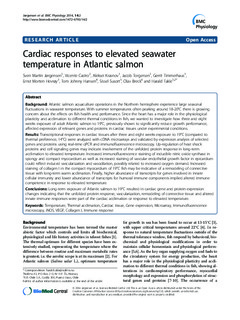| dc.contributor.author | Jørgensen, Sven Martin | |
| dc.contributor.author | Castro, Vicente | |
| dc.contributor.author | Krasnov, Aleksei | |
| dc.contributor.author | Torgersen, Jacob | |
| dc.contributor.author | Timmerhaus, Gerrit | |
| dc.contributor.author | Hevrøy, Ernst Morten | |
| dc.contributor.author | Hansen, Tom | |
| dc.contributor.author | Susort, Sissel | |
| dc.contributor.author | Breck, Olav | |
| dc.contributor.author | Takle, Harald | |
| dc.date.accessioned | 2015-01-29T16:39:58Z | |
| dc.date.available | 2015-01-29T16:39:58Z | |
| dc.date.issued | 2014-02-21 | |
| dc.identifier.citation | Jørgensen et al.: Cardiac responses to elevated seawater temperature in Atlantic salmon. BMC Physiology 2014 14:2. | nb_NO |
| dc.identifier.issn | 1472-6793 | |
| dc.identifier.uri | http://hdl.handle.net/11250/275082 | |
| dc.description.abstract | Background
Atlantic salmon aquaculture operations in the Northern hemisphere experience large seasonal fluctuations in seawater temperature. With summer temperatures often peaking around 18-20°C there is growing concern about the effects on fish health and performance. Since the heart has a major role in the physiological plasticity and acclimation to different thermal conditions in fish, we wanted to investigate how three and eight weeks exposure of adult Atlantic salmon to 19°C, previously shown to significantly reduce growth performance, affected expression of relevant genes and proteins in cardiac tissues under experimental conditions.
Results
Transcriptional responses in cardiac tissues after three and eight weeks exposure to 19°C (compared to thermal preference, 14°C) were analyzed with cDNA microarrays and validated by expression analysis of selected genes and proteins using real-time qPCR and immunofluorescence microscopy. Up-regulation of heat shock proteins and cell signaling genes may indicate involvement of the unfolded protein response in long-term acclimation to elevated temperature. Increased immunofluorescence staining of inducible nitric oxide synthase in spongy and compact myocardium as well as increased staining of vascular endothelial growth factor in epicardium could reflect induced vascularization and vasodilation, possibly related to increased oxygen demand. Increased staining of collagen I in the compact myocardium of 19°C fish may be indicative of a remodeling of connective tissue with long-term warm acclimation. Finally, higher abundance of transcripts for genes involved in innate cellular immunity and lower abundance of transcripts for humoral immune components implied altered immune competence in response to elevated temperature.
Conclusions
Long-term exposure of Atlantic salmon to 19°C resulted in cardiac gene and protein expression changes indicating that the unfolded protein response, vascularization, remodeling of connective tissue and altered innate immune responses were part of the cardiac acclimation or response to elevated temperature. | nb_NO |
| dc.language.iso | eng | nb_NO |
| dc.publisher | BioMed Central | nb_NO |
| dc.rights | Navngivelse 3.0 Norge | * |
| dc.rights.uri | http://creativecommons.org/licenses/by/3.0/no/ | * |
| dc.title | Cardiac responses to elevated seawater temperature in Atlantic salmon | nb_NO |
| dc.type | Journal article | nb_NO |
| dc.type | Peer reviewed | nb_NO |
| dc.subject.nsi | VDP::Agriculture and fishery disciplines: 900::Fisheries science: 920::Fish health: 923 | nb_NO |
| dc.source.pagenumber | 11 p. | nb_NO |
| dc.source.volume | 14 | nb_NO |
| dc.source.journal | BMC Physiology | nb_NO |
| dc.source.issue | 2 | nb_NO |
| dc.identifier.doi | 10.1186/1472-6793-14-2 | |

